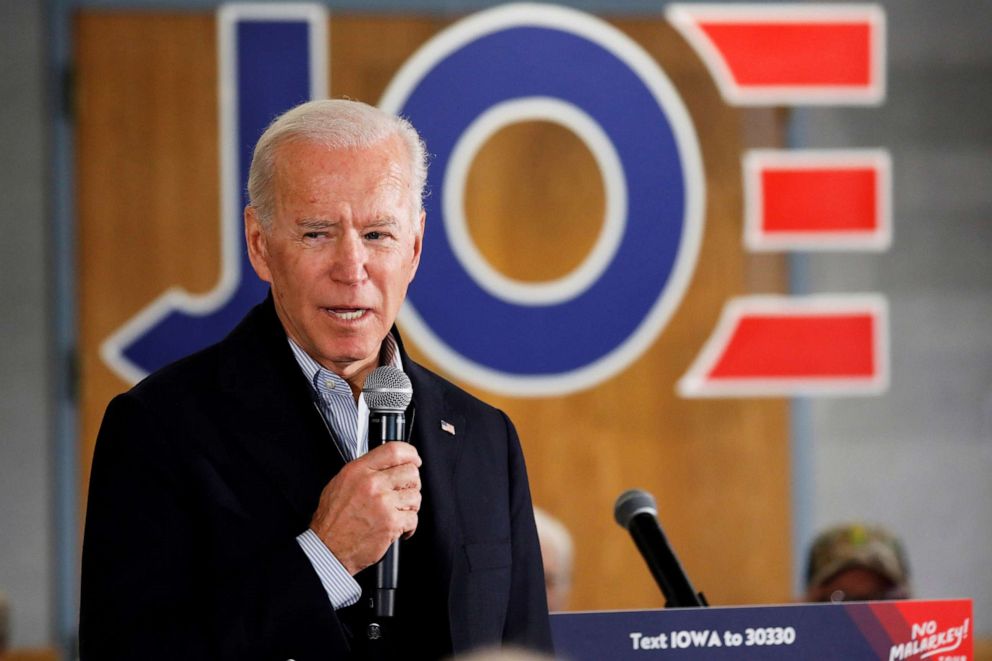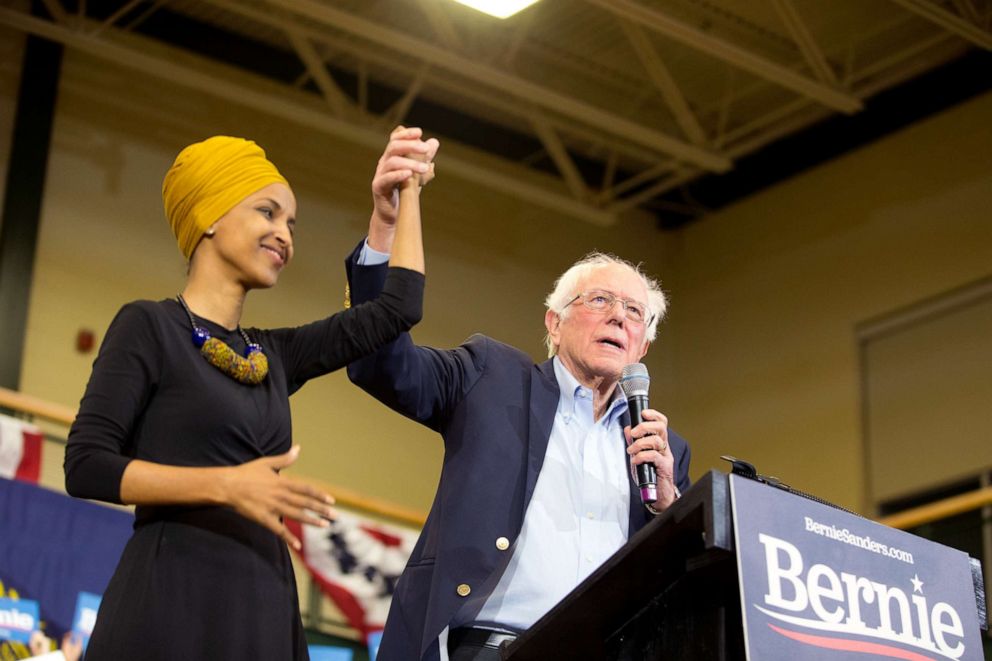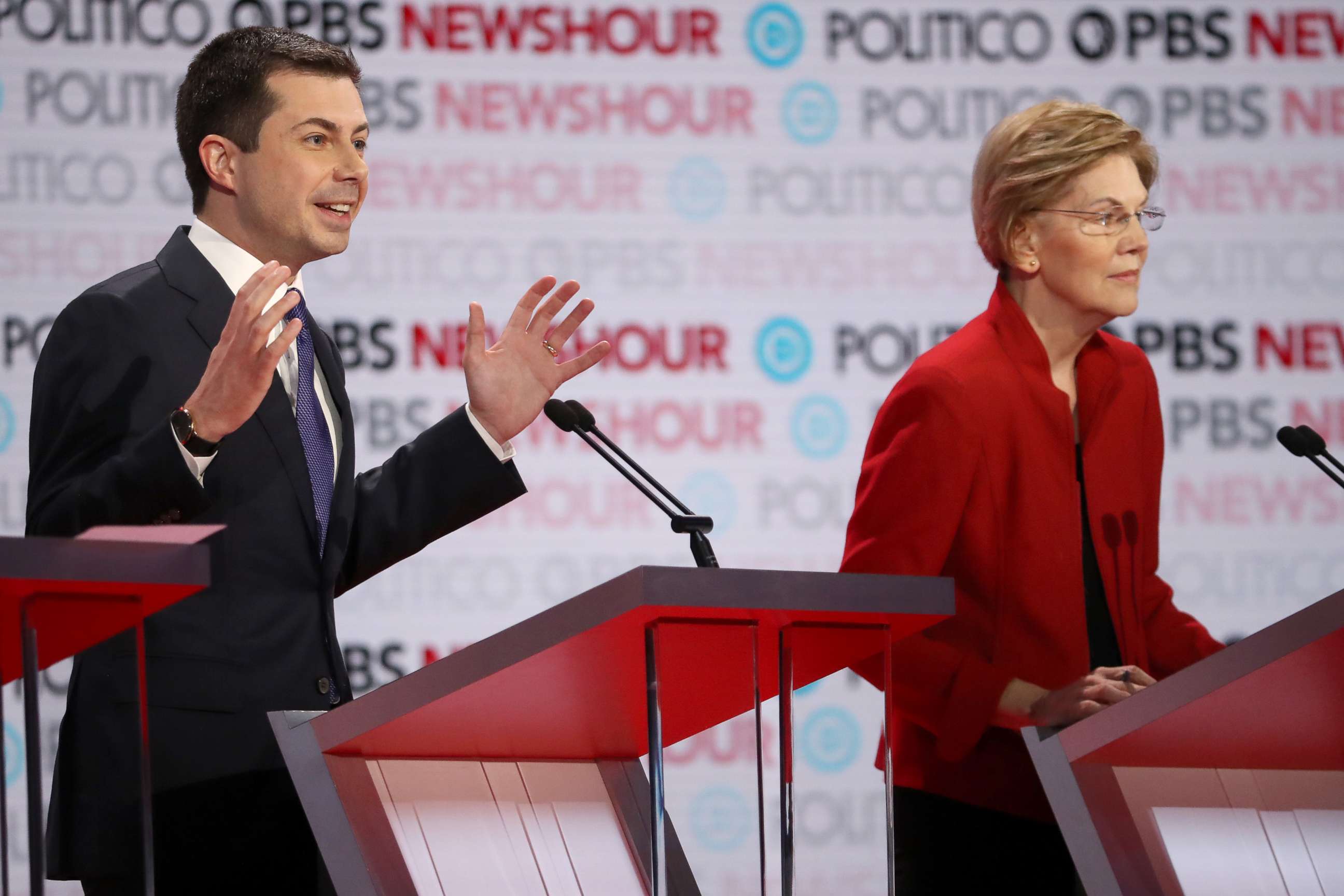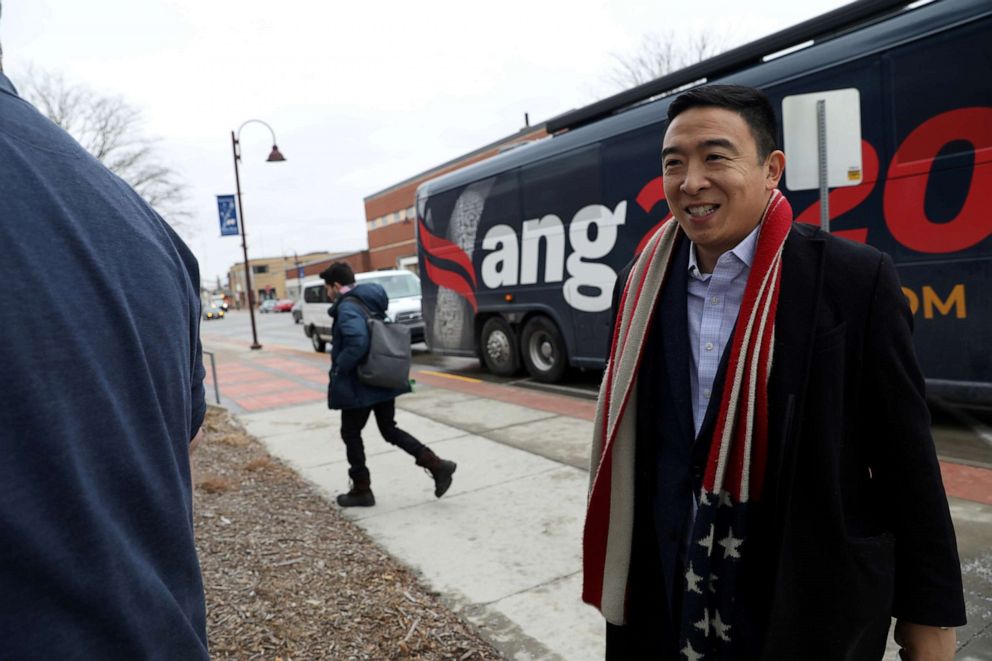Democrats clash on smallest stage yet in final primary debate of 2019
It was the Democratic primary debate that almost didn't happen.
It was the Democratic primary debate that almost didn't happen -- and also the last of 2019.
But with the labor dispute that threatened to preclude the candidates' participation in the sixth matchup resolved, the seven presidential contenders, the smallest roster yet to appear on a debate stage this cycle, squared off only one day after House Democrats voted to impeach President Donald Trump -- only the third president in American history to face that fate.
The showdown came less than two months before the first primary votes are cast in Iowa and as the top-polling candidates continue to draw battle lines pitting progressives against moderates. The matchup also came as the digs against Democratic rivals are no longer subtle and the focus on defeating Trump is even more urgent.

In the month since the last debate, Massachusetts Sen. Elizabeth Warren and South Bend, Indiana, Mayor Pete Buttigieg have spent weeks publicly feuding over transparency, Vermont Sen. Bernie Sanders appears to have outmaneuvered his progressive rival overtaking Warren in recent polling, and the House voted to approve two articles of impeachment charging the president with abuse of power and obstructing Congress. The Senate trial in January could keep at least three candidates who will be on stage in the nation's capital throughout the month of January.
For the first time, the lineup of the debate, which was co-hosted by PBS NewsHour and Politico at Loyola Marymount University in Los Angeles, featured only one candidate of color, entrepreneur Andrew Yang, after California Sen. Kamala Harris dropped out of the race in early December despite qualifying for the debate.
The seven candidates who appeared in the December debate, in podium order from left to right were:
Biden and Sanders entered the debate as two constants, as both have kept a grip Democratic primary's top-tier since they launched their presidential campaigns earlier this year -- solidifying their 1-2 status as Warren falters amid an ongoing clash with Buttigieg. Both are also training their focus on ramping up early state engagement by moving from laying the groundwork of their campaigns to engaging with early voters directly.
The former vice president recently wrapped up an eight-day "No Malarkey" bus tour through the Hawkeye State, with his campaign touting that Biden, and his wife, Jill, engaged with "3,300 caucus-goers" across rural parts of the state. In the middle of the tour, the Biden campaign also announced he raised more than $15 million in the first two months of the final fundraising quarter of the year, setting up high expectations for his ability to build up a war chest after closing out the third quarter with only $15.6 million.
During the debate, Biden, who delivers a message of returning to a pre-Trump era often on the trail, pushed back against the framing that he is pushing a message of returning to normalcy, telling the moderators, "Look, I didn't say return to normal. Normal is not enough."
Biden added, "Normal, in fact, we would have to move beyond normal, whether healthcare, the environment, whatever it is."
In the first half of the month, Sanders traveled to South Carolina, Iowa, Nevada and New Hampshire, turning out some of his largest crowds in those states to date and bringing along some his highest-profile backers, including political celebrities Reps. Alexandria Ocasio-Cortez and Ilhan Omar in recent weeks.

Despite Sanders being the oldest Democratic contender, at a stop in Nashua, New Hampshire, Omar argued that the long-time senator is the best choice to usher in a new set of political norms, telling the crowd, "One that they often use for Bernie Sanders and I is to call us radicals. Well here's the thing, if you believe that spending a trillion dollars on endless wars is radical, then we should all be proud to make sure that when we fight to end it, we are radicals."
For Buttigieg, who started shedding a nonconfrontational style during the Ohio debate in October, a public clash with Warren culminated in Buttigieg disclosing a list of his clients during a brief stint at the elite consulting firm McKinsey and Company from 2007 to 2010, and a list of his campaign's bundlers in an effort to shed light on his fundraising.
But the small-city mayor faced a fresh round of scrutiny from his 2020 opponents on stage -- despite his efforts to dismiss the infighting in the race, what he called "silly season" at a fundraiser in Baltimore last week, according to the pool report.

Warren and Buttigieg, continuing their clash on stage, traded blows over high-dollar fundraising in one of the most heated moments of the debate.
"The mayor just recently had a fundraiser that was held in a wine cave full of crystals and served 900 dollar-a-bottle wine," Warren said, criticizing her Democratic rival over a recent fundraiser in California. "Think about who comes to that ... We made the decision many years ago that rich people in smoke-filled rooms would not pick the next president of the United States. Billionaires in wine caves should not pick the next president of the United States."
Buttigieg countered the Massachusetts senator, responding, "You know, according to Forbes magazine I'm the literally the only person on this stage who is not a millionaire or a billionaire. This is important. This is the problem with issuing purity tests you cannot yourself pass ... senator, your net worth is 100 times mine."
Warren retorted, "I do not sell access to my time," adding "If you can't stand up and take the steps that are relatively easy, can't stand up to the wealthy and well-connected when it's relatively easy when you're a candidate, then how can the American people believe you're going to stand up to the wealthy and well-connected when you're president and it's really hard?"
Buttigieg, referencing Warren's $10 million transfer from her 2018 Senate campaign to underwrite her presidential campaign at its start, retaliated with another jab.
"But, also, senator, your presidential campaign right now, as we speak, is funded in part by money you transferred, having raised it at those exact same big-ticket fundraisers you now denounce," he said. "Did it corrupt you, senator? Of course not."

Although there is some distance between the top-tier and the rest of the pack, flanking the front-runners were a senator and two political outsiders who took advantage of the smaller stage and the larger national exposure that comes with it.
After qualifying for the debate, and becoming the sole minority candidate to clinch a podium, Yang told ABC News, "I'm even more confident we're going to make the next debate to keep the momentum going, because we've been investing a lot of time, energy and resources in the early states in particular."
On stage, Yang, acknowledging his status as the only candidate of color, received a big applause when he said, "It's both an honor and disappointment to be the lone candidate of color on the stage tonight. I miss Kamala, I miss Cory, though I think Cory will be back."
With more opportunities for speaking time with only seven candidates, Klobuchar, Yang and Steyer took the stage with renewed urgency to turn a breakout moment into a tangible spike, as the field enters the critical weeks leading up to February's early state contests.
ABC News' John Verhovek, Molly Nagle, Adam Kelsey, Cheyenne Haslett, Justin Gomez and Armando Garcia contributed to this report.



